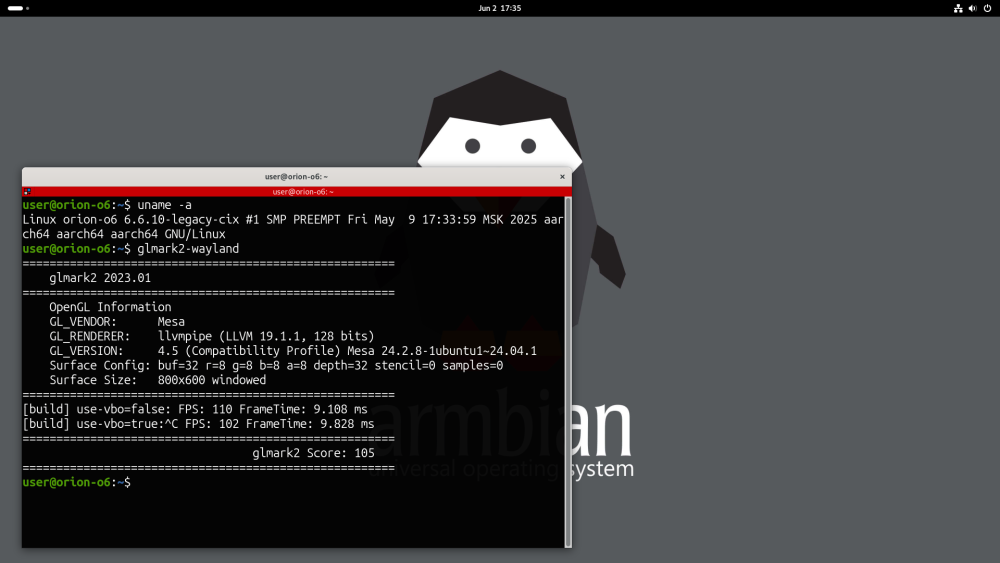All Activity
- Past hour
-
Alternatively, you can try disabling this file system verification service by connecting the SD card to a virtual machine and fixing the appropriate scripts.
-
What have you been updating? Only system files?
- Today
-
I increased the verbosity of the boot log using verbosity=7 in the ArmbianEnv.txt and this is the result: U-Boot SPL 2022.07-armbian (Feb 17 2023 - 22:31:53 +0000) DRAM: 512 MiB Trying to boot from MMC1 U-Boot 2022.07-armbian (Feb 17 2023 - 22:31:53 +0000) Allwinner Technology CPU: Allwinner H3 (SUN8I 1680) Model: Xunlong Orange Pi Lite DRAM: 512 MiB Core: 61 devices, 16 uclasses, devicetree: separate WDT: Not starting watchdog@1c20ca0 MMC: mmc@1c0f000: 0, mmc@1c10000: 1 Loading Environment from FAT... Unable to use mmc 0:1... In: serial@1c28000 Out: serial@1c28000 Err: serial@1c28000 Net: No ethernet found. starting USB... Bus usb@1c1b000: USB EHCI 1.00 Bus usb@1c1b400: USB OHCI 1.0 Bus usb@1c1c000: USB EHCI 1.00 Bus usb@1c1c400: USB OHCI 1.0 scanning bus usb@1c1b000 for devices... 1 USB Device(s) found scanning bus usb@1c1b400 for devices... 1 USB Device(s) found scanning bus usb@1c1c000 for devices... 1 USB Device(s) found scanning bus usb@1c1c400 for devices... 1 USB Device(s) found scanning usb for storage devices... 0 Storage Device(s) found Autoboot in 1 seconds, press <Space> to stop switch to partitions #0, OK mmc0 is current device Scanning mmc 0:1... Found U-Boot script /boot/boot.scr 4077 bytes read in 2 ms (1.9 MiB/s) ## Executing script at 43100000 U-boot loaded from SD Boot script loaded from mmc 153 bytes read in 2 ms (74.2 KiB/s) 16203531 bytes read in 671 ms (23 MiB/s) 10954600 bytes read in 455 ms (23 MiB/s) Found mainline kernel configuration 34541 bytes read in 8 ms (4.1 MiB/s) 4185 bytes read in 5 ms (817.4 KiB/s) Applying kernel provided DT fixup script (sun8i-h3-fixup.scr) ## Executing script at 45000000 Kernel image @ 0x42000000 [ 0x000000 - 0xa72768 ] ## Loading init Ramdisk from Legacy Image at 43400000 ... Image Name: uInitrd Image Type: ARM Linux RAMDisk Image (gzip compressed) Data Size: 16203467 Bytes = 15.5 MiB Load Address: 00000000 Entry Point: 00000000 Verifying Checksum ... OK ## Flattened Device Tree blob at 43000000 Booting using the fdt blob at 0x43000000 Loading Ramdisk to 4908c000, end 49fffecb ... OK Loading Device Tree to 4901b000, end 4908bfff ... OK Starting kernel ... [ 0.000000] Booting Linux on physical CPU 0x0 [ 0.000000] Linux version 6.12.20-current-sunxi (build@armbian) (arm-linux-gnueabihf-gcc (Ubuntu 11.4.0-1ubuntu1~22.04) 11.4.0, GNU ld (GNU Binutils for Ubuntu) 2.38) #1 SMP Sat Mar 22 19:54:28 UTC 2025 [ 0.000000] CPU: ARMv7 Processor [410fc075] revision 5 (ARMv7), cr=50c5387d [ 0.000000] CPU: div instructions available: patching division code [ 0.000000] CPU: PIPT / VIPT nonaliasing data cache, VIPT aliasing instruction cache [ 0.000000] OF: fdt: Machine model: Xunlong Orange Pi Lite [ 0.000000] Memory policy: Data cache writealloc [ 0.000000] cma: Reserved 104 MiB at 0x59800000 on node -1 [ 0.000000] Zone ranges: [ 0.000000] Normal [mem 0x0000000040000000-0x000000005fffffff] [ 0.000000] HighMem empty [ 0.000000] Movable zone start for each node [ 0.000000] Early memory node ranges [ 0.000000] node 0: [mem 0x0000000040000000-0x000000005fffffff] [ 0.000000] Initmem setup node 0 [mem 0x0000000040000000-0x000000005fffffff] [ 0.000000] OF: reserved mem: Reserved memory: No reserved-memory node in the DT [ 0.000000] psci: probing for conduit method from DT. [ 0.000000] psci: Using PSCI v0.1 Function IDs from DT [ 0.000000] percpu: Embedded 19 pages/cpu s48588 r8192 d21044 u77824 [ 0.000000] Kernel command line: root=UUID=024728b4-7d81-4433-8476-0f98407d1481 rootwait rootfstype=ext4 splash=verbose console=ttyS0,115200 console=tty1 hdmi.audio=EDID:0 disp.screen0_output_mode=1920x1080p60 consoleblank=0 loglevel=7 ubootpart=c931fae4-01 ubootsource=mmc usb-storage.quirks= sunxi_ve_mem_reserve=0 sunxi_g2d_mem_reserve=0 sunxi_fb_mem_reserve=16 cgroup_enable=memory swapaccount=1 [ 0.000000] Unknown kernel command line parameters "splash=verbose ubootpart=c931fae4-01 ubootsource=mmc sunxi_ve_mem_reserve=0 sunxi_g2d_mem_reserve=0 sunxi_fb_mem_reserve=16 cgroup_enable=memory", will be passed to user space. [ 0.000000] Dentry cache hash table entries: 65536 (order: 6, 262144 bytes, linear) [ 0.000000] Inode-cache hash table entries: 32768 (order: 5, 131072 bytes, linear) [ 0.000000] Built 1 zonelists, mobility grouping on. Total pages: 131072 [ 0.000000] mem auto-init: stack:off, heap alloc:on, heap free:off [ 0.000000] SLUB: HWalign=64, Order=0-3, MinObjects=0, CPUs=4, Nodes=1 [ 0.000000] allocated 524288 bytes of page_ext [ 0.000000] ftrace: allocating 47297 entries in 139 pages [ 0.000000] ftrace: allocated 139 pages with 4 groups [ 0.000000] rcu: Hierarchical RCU implementation. [ 0.000000] rcu: RCU restricting CPUs from NR_CPUS=8 to nr_cpu_ids=4. [ 0.000000] Rude variant of Tasks RCU enabled. [ 0.000000] Tracing variant of Tasks RCU enabled. [ 0.000000] rcu: RCU calculated value of scheduler-enlistment delay is 25 jiffies. [ 0.000000] rcu: Adjusting geometry for rcu_fanout_leaf=16, nr_cpu_ids=4 [ 0.000000] RCU Tasks Rude: Setting shift to 2 and lim to 1 rcu_task_cb_adjust=1 rcu_task_cpu_ids=4. [ 0.000000] RCU Tasks Trace: Setting shift to 2 and lim to 1 rcu_task_cb_adjust=1 rcu_task_cpu_ids=4. [ 0.000000] NR_IRQS: 16, nr_irqs: 16, preallocated irqs: 16 [ 0.000000] GIC: Using split EOI/Deactivate mode [ 0.000000] rcu: srcu_init: Setting srcu_struct sizes based on contention. [ 0.000000] clocksource: timer: mask: 0xffffffff max_cycles: 0xffffffff, max_idle_ns: 79635851949 ns [ 0.000000] arch_timer: cp15 timer(s) running at 24.00MHz (phys). [ 0.000000] clocksource: arch_sys_counter: mask: 0xffffffffffffff max_cycles: 0x588fe9dc0, max_idle_ns: 440795202592 ns [ 0.000001] sched_clock: 56 bits at 24MHz, resolution 41ns, wraps every 4398046511097ns [ 0.000016] Switching to timer-based delay loop, resolution 41ns [ 0.000529] Console: colour dummy device 80x30 [ 0.000549] printk: legacy console [tty1] enabled [ 0.001246] Calibrating delay loop (skipped), value calculated using timer frequency.. 48.00 BogoMIPS (lpj=96000) [ 0.001285] CPU: Testing write buffer coherency: ok [ 0.001353] pid_max: default: 32768 minimum: 301 [ 0.009023] LSM: initializing lsm=capability,yama,apparmor [ 0.011709] Yama: becoming mindful. [ 0.012050] AppArmor: AppArmor initialized [ 0.013300] Mount-cache hash table entries: 1024 (order: 0, 4096 bytes, linear) [ 0.013342] Mountpoint-cache hash table entries: 1024 (order: 0, 4096 bytes, linear) [ 0.018291] CPU0: thread -1, cpu 0, socket 0, mpidr 80000000 [ 0.032614] Setting up static identity map for 0x40100000 - 0x40100054 [ 0.032875] rcu: Hierarchical SRCU implementation. [ 0.032901] rcu: Max phase no-delay instances is 1000. [ 0.033322] Timer migration: 1 hierarchy levels; 8 children per group; 1 crossnode level [ 0.040208] smp: Bringing up secondary CPUs ... [ 0.070760] CPU1: thread -1, cpu 1, socket 0, mpidr 80000001 [ 0.089101] CPU2: thread -1, cpu 2, socket 0, mpidr 80000002 [ 0.111298] CPU3: thread -1, cpu 3, socket 0, mpidr 80000003 [ 0.111451] smp: Brought up 1 node, 4 CPUs [ 0.111528] SMP: Total of 4 processors activated (192.00 BogoMIPS). [ 0.111553] CPU: All CPU(s) started in HYP mode. [ 0.111569] CPU: Virtualization extensions available. [ 0.111833] Memory: 369068K/524288K available (10240K kernel code, 1682K rwdata, 9088K rodata, 1024K init, 408K bss, 45108K reserved, 106496K cma-reserved, 0K highmem) [ 0.113318] devtmpfs: initialized [ 0.123198] VFP support v0.3: implementor 41 architecture 2 part 30 variant 7 rev 5 [ 0.123512] clocksource: jiffies: mask: 0xffffffff max_cycles: 0xffffffff, max_idle_ns: 7645041785100000 ns [ 0.123591] futex hash table entries: 1024 (order: 4, 65536 bytes, linear) [ 0.130873] pinctrl core: initialized pinctrl subsystem [ 0.133981] NET: Registered PF_NETLINK/PF_ROUTE protocol family [ 0.139585] DMA: preallocated 256 KiB pool for atomic coherent allocations [ 0.140362] audit: initializing netlink subsys (disabled) [ 0.140738] audit: type=2000 audit(0.120:1): state=initialized audit_enabled=0 res=1 [ 0.141275] thermal_sys: Registered thermal governor 'fair_share' [ 0.141287] thermal_sys: Registered thermal governor 'bang_bang' [ 0.141312] thermal_sys: Registered thermal governor 'step_wise' [ 0.141407] cpuidle: using governor ladder [ 0.141477] cpuidle: using governor menu [ 0.142150] hw-breakpoint: found 5 (+1 reserved) breakpoint and 4 watchpoint registers. [ 0.142187] hw-breakpoint: maximum watchpoint size is 8 bytes. [ 0.147603] /soc/mixer@1100000: Fixed dependency cycle(s) with /soc/lcd-controller@1c0d000 [ 0.147705] /soc/mixer@1100000: Fixed dependency cycle(s) with /soc/lcd-controller@1c0c000 [ 0.147798] /soc/mixer@1200000: Fixed dependency cycle(s) with /soc/lcd-controller@1c0d000 [ 0.147876] /soc/mixer@1200000: Fixed dependency cycle(s) with /soc/lcd-controller@1c0c000 [ 0.147953] /soc/lcd-controller@1c0c000: Fixed dependency cycle(s) with /soc/hdmi@1ee0000 [ 0.148013] /soc/lcd-controller@1c0c000: Fixed dependency cycle(s) with /soc/mixer@1200000 [ 0.148072] /soc/lcd-controller@1c0c000: Fixed dependency cycle(s) with /soc/mixer@1100000 [ 0.148165] /soc/lcd-controller@1c0d000: Fixed dependency cycle(s) with /soc/mixer@1200000 [ 0.148242] /soc/lcd-controller@1c0d000: Fixed dependency cycle(s) with /soc/mixer@1100000 [ 0.148512] /soc/interrupt-controller@1c81000: Fixed dependency cycle(s) with /soc/interrupt-controller@1c81000 [ 0.148609] /soc/hdmi@1ee0000: Fixed dependency cycle(s) with /soc/lcd-controller@1c0c000 [ 0.149232] /soc/mixer@1100000: Fixed dependency cycle(s) with /soc/lcd-controller@1c0d000 [ 0.149323] /soc/mixer@1100000: Fixed dependency cycle(s) with /soc/lcd-controller@1c0c000 [ 0.149656] /soc/mixer@1200000: Fixed dependency cycle(s) with /soc/lcd-controller@1c0d000 [ 0.149746] /soc/mixer@1200000: Fixed dependency cycle(s) with /soc/lcd-controller@1c0c000 [ 0.150192] /soc/mixer@1200000: Fixed dependency cycle(s) with /soc/lcd-controller@1c0c000 [ 0.150361] /soc/mixer@1100000: Fixed dependency cycle(s) with /soc/lcd-controller@1c0c000 [ 0.150481] /soc/lcd-controller@1c0c000: Fixed dependency cycle(s) with /soc/hdmi@1ee0000 [ 0.150546] /soc/lcd-controller@1c0c000: Fixed dependency cycle(s) with /soc/mixer@1200000 [ 0.150668] /soc/lcd-controller@1c0c000: Fixed dependency cycle(s) with /soc/mixer@1100000 [ 0.151000] /soc/mixer@1200000: Fixed dependency cycle(s) with /soc/lcd-controller@1c0d000 [ 0.151146] /soc/mixer@1100000: Fixed dependency cycle(s) with /soc/lcd-controller@1c0d000 [ 0.151316] /soc/lcd-controller@1c0d000: Fixed dependency cycle(s) with /soc/mixer@1200000 [ 0.151489] /soc/lcd-controller@1c0d000: Fixed dependency cycle(s) with /soc/mixer@1100000 [ 0.156056] /soc/lcd-controller@1c0c000: Fixed dependency cycle(s) with /soc/hdmi@1ee0000 [ 0.156189] /soc/hdmi@1ee0000: Fixed dependency cycle(s) with /soc/lcd-controller@1c0c000 [ 0.159836] /soc/hdmi@1ee0000: Fixed dependency cycle(s) with /connector [ 0.160029] /connector: Fixed dependency cycle(s) with /soc/hdmi@1ee0000 [ 0.168742] cryptd: max_cpu_qlen set to 1000 [ 0.235571] raid6: neonx8 gen() 651 MB/s [ 0.303737] raid6: neonx4 gen() 897 MB/s [ 0.371873] raid6: neonx2 gen() 911 MB/s [ 0.440002] raid6: neonx1 gen() 745 MB/s [ 0.508214] raid6: int32x8 gen() 283 MB/s [ 0.576293] raid6: int32x4 gen() 315 MB/s [ 0.644411] raid6: int32x2 gen() 410 MB/s [ 0.712588] raid6: int32x1 gen() 370 MB/s [ 0.712612] raid6: using algorithm neonx2 gen() 911 MB/s [ 0.780667] raid6: .... xor() 674 MB/s, rmw enabled [ 0.780689] raid6: using neon recovery algorithm [ 0.782486] iommu: Default domain type: Translated [ 0.782528] iommu: DMA domain TLB invalidation policy: strict mode [ 0.783908] SCSI subsystem initialized [ 0.784458] usbcore: registered new interface driver usbfs [ 0.784519] usbcore: registered new interface driver hub [ 0.784600] usbcore: registered new device driver usb [ 0.784943] pps_core: LinuxPPS API ver. 1 registered [ 0.784968] pps_core: Software ver. 5.3.6 - Copyright 2005-2007 Rodolfo Giometti <giometti@linux.it> [ 0.785012] PTP clock support registered [ 0.785516] Advanced Linux Sound Architecture Driver Initialized. [ 0.786754] NetLabel: Initializing [ 0.786783] NetLabel: domain hash size = 128 [ 0.786801] NetLabel: protocols = UNLABELED CIPSOv4 CALIPSO [ 0.786917] NetLabel: unlabeled traffic allowed by default [ 0.787851] clocksource: Switched to clocksource arch_sys_counter [ 0.794549] VFS: Disk quotas dquot_6.6.0 [ 0.794871] VFS: Dquot-cache hash table entries: 1024 (order 0, 4096 bytes) [ 0.795622] AppArmor: AppArmor Filesystem Enabled [ 0.808697] NET: Registered PF_INET protocol family [ 0.808948] IP idents hash table entries: 8192 (order: 4, 65536 bytes, linear) [ 0.883375] tcp_listen_portaddr_hash hash table entries: 512 (order: 0, 4096 bytes, linear) [ 0.883555] Table-perturb hash table entries: 65536 (order: 6, 262144 bytes, linear) [ 0.883638] TCP established hash table entries: 4096 (order: 2, 16384 bytes, linear) [ 0.883752] TCP bind hash table entries: 4096 (order: 4, 65536 bytes, linear) [ 0.883974] TCP: Hash tables configured (established 4096 bind 4096) [ 0.884205] UDP hash table entries: 256 (order: 1, 8192 bytes, linear) [ 0.884284] UDP-Lite hash table entries: 256 (order: 1, 8192 bytes, linear) [ 0.884887] NET: Registered PF_UNIX/PF_LOCAL protocol family [ 0.885366] Trying to unpack rootfs image as initramfs... [ 0.888431] Initialise system trusted keyrings [ 0.888557] Key type blacklist registered [ 0.889022] workingset: timestamp_bits=14 max_order=17 bucket_order=3 [ 0.889130] zbud: loaded [ 0.891215] squashfs: version 4.0 (2009/01/31) Phillip Lougher [ 0.899985] fuse: init (API version 7.41) [ 0.914435] integrity: Platform Keyring initialized [ 0.914533] xor: measuring software checksum speed [ 0.917141] arm4regs : 1269 MB/sec [ 0.920977] 8regs : 864 MB/sec [ 0.924937] 32regs : 837 MB/sec [ 0.927446] neon : 1328 MB/sec [ 0.927469] xor: using function: neon (1328 MB/sec) [ 0.927521] Key type asymmetric registered [ 0.927547] Asymmetric key parser 'x509' registered [ 0.927956] Block layer SCSI generic (bsg) driver version 0.4 loaded (major 247) [ 0.928348] io scheduler mq-deadline registered [ 0.928383] io scheduler kyber registered [ 0.928867] io scheduler bfq registered [ 0.937315] ledtrig-cpu: registered to indicate activity on CPUs [ 0.947390] Serial: 8250/16550 driver, 8 ports, IRQ sharing disabled [ 0.962847] brd: module loaded [ 0.970236] loop: module loaded [ 0.975369] usbcore: registered new interface driver usb-storage [ 0.976945] sun6i-rtc 1f00000.rtc: registered as rtc0 [ 0.977021] sun6i-rtc 1f00000.rtc: setting system clock to 1970-01-01T00:00:09 UTC (9) [ 0.977616] i2c_dev: i2c /dev entries driver [ 0.979287] sunxi-wdt 1c20ca0.watchdog: Watchdog enabled (timeout=16 sec, nowayout=0) [ 0.981037] sun8i-ce 1c15000.crypto: Set mod clock to 50000000 (50 Mhz) from 24000000 (24 Mhz) [ 0.981574] sun8i-ce 1c15000.crypto: will run requests pump with realtime priority [ 0.983494] sun8i-ce 1c15000.crypto: will run requests pump with realtime priority [ 0.984564] sun8i-ce 1c15000.crypto: will run requests pump with realtime priority [ 0.985967] sun8i-ce 1c15000.crypto: will run requests pump with realtime priority [ 0.987114] sun8i-ce 1c15000.crypto: Register cbc(aes) [ 0.987172] sun8i-ce 1c15000.crypto: Register ecb(aes) [ 0.987201] sun8i-ce 1c15000.crypto: Register cbc(des3_ede) [ 0.987230] sun8i-ce 1c15000.crypto: Register ecb(des3_ede) [ 0.987258] sun8i-ce 1c15000.crypto: Register md5 [ 0.987286] sun8i-ce 1c15000.crypto: Register sha1 [ 0.987313] sun8i-ce 1c15000.crypto: Register sha224 [ 0.987340] sun8i-ce 1c15000.crypto: Register sha256 [ 0.987368] sun8i-ce 1c15000.crypto: Register sha384 [ 0.987396] sun8i-ce 1c15000.crypto: Register sha512 [ 0.987424] sun8i-ce 1c15000.crypto: Register stdrng [ 0.987476] sun8i-ce 1c15000.crypto: TRNG not supported [ 0.987498] sun8i-ce 1c15000.crypto: CryptoEngine Die ID 1 [ 0.988276] hid: raw HID events driver (C) Jiri Kosina [ 0.988410] usbcore: registered new interface driver usbhid [ 0.988434] usbhid: USB HID core driver [ 0.989841] hw perfevents: enabled with armv7_cortex_a7 PMU driver, 5 (8000000f) counters available [ 0.998362] NET: Registered PF_INET6 protocol family [ 1.888098] Freeing initrd memory: 15824K [ 1.933018] Segment Routing with IPv6 [ 1.933170] In-situ OAM (IOAM) with IPv6 [ 1.933405] NET: Registered PF_PACKET protocol family [ 1.933442] NET: Registered PF_KEY protocol family [ 1.933492] bridge: filtering via arp/ip/ip6tables is no longer available by default. Update your scripts to load br_netfilter if you need this. [ 1.933815] Key type dns_resolver registered [ 1.934531] Registering SWP/SWPB emulation handler [ 1.945502] registered taskstats version 1 [ 1.945950] Loading compiled-in X.509 certificates [ 1.962105] zswap: loaded using pool zstd/zbud [ 1.963420] Key type .fscrypt registered [ 1.963460] Key type fscrypt-provisioning registered [ 1.972392] Btrfs loaded, zoned=no, fsverity=yes [ 2.080019] Key type encrypted registered [ 2.080086] AppArmor: AppArmor sha256 policy hashing enabled [ 2.093522] gpio gpiochip0: Static allocation of GPIO base is deprecated, use dynamic allocation. [ 2.096815] sun8i-h3-pinctrl 1c20800.pinctrl: initialized sunXi PIO driver [ 2.097462] gpio gpiochip1: Static allocation of GPIO base is deprecated, use dynamic allocation. [ 2.099317] sun8i-h3-r-pinctrl 1f02c00.pinctrl: initialized sunXi PIO driver [ 2.099726] sun8i-h3-r-pinctrl 1f02c00.pinctrl: supply vcc-pl not found, using dummy regulator [ 2.100225] sun8i-h3-pinctrl 1c20800.pinctrl: supply vcc-pa not found, using dummy regulator [ 2.101428] printk: legacy console [ttyS0] disabled [ 2.101940] 1c28000.serial: ttyS0 at MMIO 0x1c28000 (irq = 137, base_baud = 1500000) is a 16550A [ 2.102029] printk: legacy console [ttyS0] enabled [ 3.575500] sun4i-drm display-engine: bound 1100000.mixer (ops 0xc0bb3120) [ 3.584507] sun4i-drm display-engine: bound 1200000.mixer (ops 0xc0bb3120) [ 3.592002] sun4i-drm display-engine: bound 1c0c000.lcd-controller (ops 0xc0bae998) [ 3.600067] sun4i-drm display-engine: bound 1c0d000.lcd-controller (ops 0xc0bae998) [ 3.607870] sun8i-dw-hdmi 1ee0000.hdmi: supply hvcc not found, using dummy regulator [ 3.616696] sun8i-dw-hdmi 1ee0000.hdmi: Detected HDMI TX controller v1.32a with HDCP (sun8i_dw_hdmi_phy) [ 3.627060] sun8i-dw-hdmi 1ee0000.hdmi: registered DesignWare HDMI I2C bus driver [ 3.635043] sun4i-drm display-engine: bound 1ee0000.hdmi (ops 0xc0bb24f4) [ 3.642914] [drm] Initialized sun4i-drm 1.0.0 for display-engine on minor 0 [ 3.650020] sun4i-drm display-engine: [drm] Cannot find any crtc or sizes [ 3.659131] sun4i-drm display-engine: [drm] Cannot find any crtc or sizes [ 3.659141] ehci-platform 1c1b000.usb: EHCI Host Controller [ 3.659177] ehci-platform 1c1b000.usb: new USB bus registered, assigned bus number 1 [ 3.659323] ehci-platform 1c1c000.usb: EHCI Host Controller [ 3.659347] ehci-platform 1c1c000.usb: new USB bus registered, assigned bus number 2 [ 3.660110] ohci-platform 1c1b400.usb: Generic Platform OHCI controller [ 3.660138] ohci-platform 1c1b400.usb: new USB bus registered, assigned bus number 3 [ 3.662425] ohci-platform 1c1c400.usb: Generic Platform OHCI controller [ 3.662457] ohci-platform 1c1c400.usb: new USB bus registered, assigned bus number 4 [ 3.663443] sun8i-h3-pinctrl 1c20800.pinctrl: supply vcc-pf not found, using dummy regulator [ 3.669161] of_cfs_init [ 3.669392] sun8i-h3-pinctrl 1c20800.pinctrl: supply vcc-pg not found, using dummy regulator [ 3.741438] of_cfs_init: OK [ 3.963158] clk: Disabling unused clocks [ 3.967280] PM: genpd: Disabling unused power domains [ 3.972372] ALSA device list: [ 3.975357] No soundcards found. [ 3.979497] ohci-platform 1c1b400.usb: irq 143, io mem 0x01c1b400 [ 3.985921] ohci-platform 1c1c400.usb: irq 144, io mem 0x01c1c400 [ 3.992262] sunxi-mmc 1c0f000.mmc: Got CD GPIO [ 3.997857] ehci-platform 1c1b000.usb: irq 141, io mem 0x01c1b000 [ 4.004142] ehci-platform 1c1c000.usb: irq 142, io mem 0x01c1c000 [ 4.015878] ehci-platform 1c1b000.usb: USB 2.0 started, EHCI 1.00 [ 4.022044] sunxi-mmc 1c10000.mmc: initialized, max. request size: 16384 KB [ 4.022047] sunxi-mmc 1c0f000.mmc: initialized, max. request size: 16384 KB [ 4.022437] usb usb1: New USB device found, idVendor=1d6b, idProduct=0002, bcdDevice= 6.12 [ 4.031853] ehci-platform 1c1c000.usb: USB 2.0 started, EHCI 1.00 [ 4.036031] usb usb1: New USB device strings: Mfr=3, Product=2, SerialNumber=1 [ 4.046899] mmc1: new high speed SDIO card at address 0001 [ 4.050442] usb usb1: Product: EHCI Host Controller [ 4.068066] usb usb1: Manufacturer: Linux 6.12.20-current-sunxi ehci_hcd [ 4.071720] mmc0: host does not support reading read-only switch, assuming write-enable [ 4.074796] usb usb1: SerialNumber: 1c1b000.usb [ 4.077691] mmc0: new high speed SDHC card at address aaaa [ 4.083597] hub 1-0:1.0: USB hub found [ 4.089185] mmcblk0: mmc0:aaaa SD32G 29.7 GiB [ 4.093059] hub 1-0:1.0: 1 port detected [ 4.105221] mmcblk0: p1 [ 4.105964] usb usb2: New USB device found, idVendor=1d6b, idProduct=0002, bcdDevice= 6.12 [ 4.116087] usb usb2: New USB device strings: Mfr=3, Product=2, SerialNumber=1 [ 4.123345] usb usb2: Product: EHCI Host Controller [ 4.128249] usb usb2: Manufacturer: Linux 6.12.20-current-sunxi ehci_hcd [ 4.134973] usb usb2: SerialNumber: 1c1c000.usb [ 4.140187] hub 2-0:1.0: USB hub found [ 4.144031] hub 2-0:1.0: 1 port detected [ 4.148675] usb usb4: New USB device found, idVendor=1d6b, idProduct=0001, bcdDevice= 6.12 [ 4.156998] usb usb4: New USB device strings: Mfr=3, Product=2, SerialNumber=1 [ 4.164252] usb usb4: Product: Generic Platform OHCI controller [ 4.170195] usb usb4: Manufacturer: Linux 6.12.20-current-sunxi ohci_hcd [ 4.176918] usb usb4: SerialNumber: 1c1c400.usb [ 4.182069] hub 4-0:1.0: USB hub found [ 4.185928] hub 4-0:1.0: 1 port detected [ 4.190546] usb usb3: New USB device found, idVendor=1d6b, idProduct=0001, bcdDevice= 6.12 [ 4.198860] usb usb3: New USB device strings: Mfr=3, Product=2, SerialNumber=1 [ 4.206109] usb usb3: Product: Generic Platform OHCI controller [ 4.212052] usb usb3: Manufacturer: Linux 6.12.20-current-sunxi ohci_hcd [ 4.218774] usb usb3: SerialNumber: 1c1b400.usb [ 4.223965] hub 3-0:1.0: USB hub found [ 4.227783] hub 3-0:1.0: 1 port detected [ 4.237319] Freeing unused kernel image (initmem) memory: 1024K [ 4.243797] Run /init as init process done. Begin: Mounting root file system ... Begin: Running /scripts/local-top ... done. Begin: Running /scripts/local-premount ... Scanning for Btrfs filesystems done. Begin: Will now check root file system ... fsck from util-linux 2.36.1 [/sbin/fsck.ext4 (1) -- /dev/mmcblk0p1] fsck.ext4 -a -C0 /dev/mmcblk0p1 armbi_root: clean, 60912/1812480 files, 1248402/7711744 blocks done. mount: No such device Failed to mount /dev/mmcblk0p1 as root file system.
-

Is it possible to boot Armbian from SD card only?
temporary_name replied to temporary_name's topic in Amlogic CPU Boxes
Jens J, woah, I didn't know that you can just split bootloader like that! I did that, and so far, it looks good! TV Box boots into u-boot with this SD card, and it has a partition table. Thank you so much! Now I'll try to make an SD card with system on it -
Here's my ArmbianEnv.txt verbosity=1 bootlogo=false console=both disp_mode=1920x1080p60 overlay_prefix=sun8i-h3 rootdev=UUID=024728b4-7d81-4433-8476-0f98407d1481 rootfstype=ext4 And /etc/fstab: UUID=024728b4-7d81-4433-8476-0f98407d1481 / ext4 defaults,noatime,commit=600,errors=remount-ro 0 1 tmpfs /tmp tmpfs defaults,nosuid 0 0
-
Hi guys, I updated my Orange Pi Lite some time ago and it caused it to stop booting. The boot log is below. Can someone please help me recover this? I'm not sure where to start. I've loaded the SD card into an Ubuntu VM and it reads perfectly fine. U-Boot SPL 2022.07-armbian (Feb 17 2023 - 22:31:53 +0000) DRAM: 512 MiB Trying to boot from MMC1 U-Boot 2022.07-armbian (Feb 17 2023 - 22:31:53 +0000) Allwinner Technology CPU: Allwinner H3 (SUN8I 1680) Model: Xunlong Orange Pi Lite DRAM: 512 MiB Core: 61 devices, 16 uclasses, devicetree: separate WDT: Not starting watchdog@1c20ca0 MMC: mmc@1c0f000: 0, mmc@1c10000: 1 Loading Environment from FAT... Unable to use mmc 0:1... In: serial@1c28000 Out: serial@1c28000 Err: serial@1c28000 Net: No ethernet found. starting USB... Bus usb@1c1b000: USB EHCI 1.00 Bus usb@1c1b400: USB OHCI 1.0 Bus usb@1c1c000: USB EHCI 1.00 Bus usb@1c1c400: USB OHCI 1.0 scanning bus usb@1c1b000 for devices... 1 USB Device(s) found scanning bus usb@1c1b400 for devices... 1 USB Device(s) found scanning bus usb@1c1c000 for devices... 1 USB Device(s) found scanning bus usb@1c1c400 for devices... 1 USB Device(s) found scanning usb for storage devices... 0 Storage Device(s) found Autoboot in 1 seconds, press <Space> to stop switch to partitions #0, OK mmc0 is current device Scanning mmc 0:1... Found U-Boot script /boot/boot.scr 4077 bytes read in 3 ms (1.3 MiB/s) ## Executing script at 43100000 U-boot loaded from SD Boot script loaded from mmc 153 bytes read in 2 ms (74.2 KiB/s) 16203531 bytes read in 671 ms (23 MiB/s) 10954600 bytes read in 455 ms (23 MiB/s) Found mainline kernel configuration 34541 bytes read in 8 ms (4.1 MiB/s) 4185 bytes read in 5 ms (817.4 KiB/s) Applying kernel provided DT fixup script (sun8i-h3-fixup.scr) ## Executing script at 45000000 Kernel image @ 0x42000000 [ 0x000000 - 0xa72768 ] ## Loading init Ramdisk from Legacy Image at 43400000 ... Image Name: uInitrd Image Type: ARM Linux RAMDisk Image (gzip compressed) Data Size: 16203467 Bytes = 15.5 MiB Load Address: 00000000 Entry Point: 00000000 Verifying Checksum ... OK ## Flattened Device Tree blob at 43000000 Booting using the fdt blob at 0x43000000 Loading Ramdisk to 4908c000, end 49fffecb ... OK Loading Device Tree to 4901b000, end 4908bfff ... OK Starting kernel ... done. Begin: Mounting root file system ... Begin: Running /scripts/local-top ... done. Begin: Running /scripts/local-premount ... Scanning for Btrfs filesystems done. Begin: Will now check root file system ... fsck from util-linux 2.36.1 [/sbin/fsck.ext4 (1) -- /dev/mmcblk0p1] fsck.ext4 -a -C0 /dev/mmcblk0p1 armbi_root: clean, 60912/1812480 files, 1248402/7711744 blocks done. mount: No such device Failed to mount /dev/mmcblk0p1 as root file system.
-

Is it possible to boot Armbian from SD card only?
Jens J. replied to temporary_name's topic in Amlogic CPU Boxes
So when writing the u-boot to SD card, you need to follow a special process to "skip" over some bytes to prevent trashing the partition table. see https://www.cnx-software.com/2016/11/19/how-to-create-a-bootable-recovery-sd-card-for-amlogic-tv-boxes/ TLDR, something like: sudo umount /dev/sdX* sudo dd if=aml_sdc_burn.UBOOT of=/dev/sdX bs=1 count=442 sudo dd if=aml_sdc_burn.UBOOT of=/dev/sdX seek=1 skip=1 bs=512 sync -

Armbian on Box K12 Bqeel / Mini M8S pro C (S912)
Jens J. replied to RuDy_74's topic in Amlogic CPU Boxes
Have you tried `/boot/dtb/amlogic/meson-gxm-mini-m8s-pro.dtb` ? What is wifi chip? Is it LTM8830? If so this is QCA9377 clone, and this dtb should be fully working. -
Any luck yet? I have a v4.1 board. None of the image is working. Anyone tried these ? https://github.com/velvet-os/imagebuilder/blob/main/systems/allwinner_h616/readme.md
- Yesterday
-
Hi everyone, I’m working on a custom Armbian build for an RK3588-based board (cm3588-nas) and trying to completely disable the Rockchip crypto driver (rk_crypto2), since it's negatively impacting LUKS (AES-XTS) performance. Despite several attempts, the module continues to register algorithms in /proc/crypto after boot: driver : rk2-sm3 module : rk_crypto2 driver : rk2-sha512 module : rk_crypto2 driver : xts-aes-rk2 module : rk_crypto2 ... ------------------------------------------------------------ What I’ve Tried ------------------------------------------------------------ 1. Kernel Config Override - Added CONFIG_CRYPTO_DEV_ROCKCHIP=n and CONFIG_CRYPTO_DEV_ROCKCHIP2=n to: userpatches/linux-rockchip-rk3588-edge.config - Verified .config has it set to n after build. - Used CLEAN_LEVEL="make,debs,oldcache" in the build command. 2. Blacklisting & Deletion in customize-image.sh echo "blacklist rk_crypto" > /etc/modprobe.d/blacklist-rk_crypto.conf rm -f /lib/modules/*/kernel/drivers/crypto/rockchip/rk_crypto.ko* 3. Post-Boot Verification - lsmod | grep rk_crypto → empty - modinfo rk_crypto → module not found - /proc/crypto still shows rk2-* drivers tied to rk_crypto2 4. Manual Source Removal - Commented out this line in drivers/crypto/rockchip/Makefile: # obj-$(CONFIG_CRYPTO_DEV_ROCKCHIP) += rk_crypto.o - Also removed or disabled its Kconfig entry. ------------------------------------------------------------ System Details ------------------------------------------------------------ Board : cm3588-nas (RK3588) Kernel : rockchip-rk3588 edge (Linux 6.8.x) Builder : Official Armbian compile.sh ------------------------------------------------------------ Goal ------------------------------------------------------------ I want to fully disable the Rockchip crypto engine (rk_crypto2): - It should not load, not build, and not register anything in /proc/crypto. - LUKS should fall back to software crypto (cryptd, aesni, or default fallback). ------------------------------------------------------------ Any help is appreciated. I’d love to hear from anyone who’s successfully disabled rk_crypto2 entirely or has ideas for where the registration is coming from even when the module appears removed. Thanks!
-

Helios-64 Fails to boot since upgrading to Bookworm
Igor replied to Carlos Hartmann's topic in Rockchip
We keep (most of) old images here: https://fi.mirror.armbian.de/archive/ https://fi.mirror.armbian.de/oldarchive/ -

Helios-64 Fails to boot since upgrading to Bookworm
Carlos Hartmann replied to Carlos Hartmann's topic in Rockchip
I see, now I get it! So it's everyone's duty to keep around what they think might still be necessary ahead. Did not know of this quirk in the world of Linux. Definitely OT: This explains the running gag among data hoarders when they justify their ample storage space with "Linux ISOs" but really mean socially less accepted things. -

Helios-64 Fails to boot since upgrading to Bookworm
djurny replied to Carlos Hartmann's topic in Rockchip
Hi @Carlos Hartmann, Backups of anything are a good thing. So my advise would be to always keep the ISOs you downloaded somewhere 'safe'. Not that safe that you will forget where you stashed it of course (looking at you @djurny...). Groetjes, -
Hi @Vodalex, Write down the MAC address of the interface you want to use to wake up the Helios4. ip link show You would need to put the Helios4 in suspend, by either: sudo pm-suspend or: echo 'suspend' | sudo tee /sys/power/state To wake it up, from another system, make sure that wakeonlan is installed. Then: wakeonlan ${HARDWARE_ADDRESS} That should be it. Groetjes,
-

Helios-64 Fails to boot since upgrading to Bookworm
Carlos Hartmann replied to Carlos Hartmann's topic in Rockchip
Oh yes, I've been meaning to test an older version but didn't find any anywhere. Can you upload here directly? Maybe slightly OT: Do you know why older versions aren't preserved anywhere? I thought it'd be easy to find buster and bullseye images but didn't manage at all. Seems like it can't be too uncommon that a newer version causes issues and one has to fall back. -
Did anyone managed to get Linux working on TX6S?
-

what can you tell about the non free software bl30 blob?
Igor replied to renky's topic in Libre Le Potato
This is what AI tells: Role of BL30 The BL30 component serves as the firmware for the Amlogic Secure Co-Processor (SCP). Its primary responsibilities include managing system-level operations such as Dynamic Voltage and Frequency Scaling (DVFS) and handling suspend/resume functionalities. These tasks are crucial for optimizing power consumption and ensuring efficient thermal management within the system. lists.denx.de In addition to BL30, there is a closely related component called BL301. BL301 acts as a board-specific firmware "plug-in" that provides customized parameters for DVFS and suspend/resume operations, tailored to the specific hardware configuration of the board. lists.denx.de Integration into the Boot Process The typical boot sequence in Amlogic devices follows this order: BL2 → BL30 → BL31 → BL33. Each stage is responsible for initializing specific aspects of the system, with BL30 focusing on power management and system control tasks. If any stage fails, the boot process may attempt to fall back to an alternative boot medium, although this behavior can vary depending on the specific SoC and its configuration. 7Ji’s Blog+1lists.denx.de+1 Understanding the role of BL30 is essential for developers and system integrators working with Amlogic platforms, especially when customizing firmware or troubleshooting boot-related issues. All Amlogic SoCs boards needs this. AFAIK here we don't have open source alternative. Only from the owner of this file after you sign certain papers https://www.amlogic.com/#Company/Contact/index.html This is complex operation and possible where / when there is a big enough interest and when more people join in this common interest and are willing to sacrifice months of their precious private time. https://github.com/crust-firmware/crust Here is an example of similar feature for some other SoC (allwinner). It works, but it's also not feature complete and probably never will. Many of those SoCs are already commercially obsolete, similar for the one you are asking. -
-

Helios-64 Fails to boot since upgrading to Bookworm
djurny replied to Carlos Hartmann's topic in Rockchip
Hi there, I think what would be next is to try an older image to see if the serial console and hardware itself are still working. If you're interested, I still have a version here locally: Armbian_20.08.10_Helios64_buster_current_5.8.14.img.xz. Groetjes, -
Thanks! Just run upgrade to 6.12.30 - and sounds works! (on 6.12.20 was no sound card in aplay -l )
-
@MBeck @batoisai I’m selling mine as well (Belgium) if one of you guys are still interested. Work as intended, maintained well (looks as new), no 2.5Gbit LAN mod done either.
-

Helios-64 Fails to boot since upgrading to Bookworm
Carlos Hartmann replied to Carlos Hartmann's topic in Rockchip
I set up an Ubuntu VM on my Mac to do linux stuff. With that I edited the ambianEnv.txt as you said. Behavior is the same. I should also add that there is a regular double-blink of the System LED after the initial fans (of about 2-3 seconds). I now remember that back when I set up the Helios, I was told to use PuTTY on Windows instead of my mac. Maybe there's an incompatibility of some sort? I checked and they recommend a set of drivers for Mac that I hadn't installed. I did and after playing around -- and only occasionally while playing around with connecting, disconnecting, rebooting -- did I sometimes get some garbled output in the serial window: posting it because it's the longest and least garbled output I've gotten so far. The command was exactly as on the Helios64 website, i.e. the baud rate was correct. Not sure where to go from here and what to blame. -
Replying to my own again...UEFI doesn't seem to boot from SD if you don't modify the HW, it does boot from the internal eMMC, though! All you need to do is flash the EDK2/UEFI bios (1.1 at the point of writing) to the internal eMMC and then fix the GPT (I just run GParted or KDE Partition Manager - that asks you a couple of questions and fixes the parition table). After that you can just run the e.g. Fedora Rawhide ARM64 iso and install to the same eMMC (just have the installer "add the OS" - it will not change the GPT or overwrite the bios). After that you can boot from USB, SD, NVME and even a SATA with a m2 sata adapter.



